These days, content marketing isn’t just a buzzword — it’s the fuel that drives visibility, engagement, and sales. In a digital-first world, content has become the currency of social media, SEO, and even trust. Case in point: one study found that 70% of consumers prefer to learn about a brand through content like blog posts and articles, rather than ads.
And when it comes to how people actually consume that content? It’s everything from TikTok tutorials and YouTube demos to long-form guides and thought leadership pieces. That’s why brands today don’t just need more content — they need the right content, delivered consistently and strategically. That’s where content marketing platforms come in. Let’s take a look at how they can help you stay organized, create smarter, and drive better results.
What are the Different Types of Content Marketing?
Content marketing comes in all shapes and sizes. And if you’re feeling overwhelmed by just how many formats are out there, you’re not alone. That’s exactly why having a solid content marketing platform matters — it helps you manage and make sense of it all.
To break things down, most content typically falls into a few core categories:
Long-form content
This includes blog posts, podcast episodes, white papers, eBooks, and in-depth videos. It’s the kind of content that builds trust, drives SEO, and helps establish authority. It’s not always flashy, but it delivers real value over time.
Social and short-form content
We’re talking about bite-sized videos, LinkedIn updates, Instagram posts, and TikToks. This content is built for quick engagement and brand visibility. It doesn’t just live on social — it thrives there.
Lead-generating and educational content
Case studies, webinars, email courses, templates, and checklists fall into this group. These are often gated or part of a funnel. They’re designed to move people from awareness to action, especially in B2B or service-based marketing.
User-generated and community-driven content
This is content that comes from your customers, fans, or even employees — reviews, testimonials, social mentions, interviews, or even branded communities. It’s powerful because it builds trust and credibility in ways traditional marketing can’t.
Every brand will lean into different types depending on its audience and goals, but the point is this: it all adds up. And managing all of it without the right system in place? That’s where things can start to fall apart. Which is why choosing the right platform is so important.
What Is a Content Marketing Platform (CMP), and Why Do You Need One?
A content marketing platform (CMP) is a software tool that helps you manage the full content lifecycle—planning, creation, collaboration, publishing, and performance—all in one place.
Let’s get this straight: a CMP isn’t just a fancy content calendar or a glorified blog manager. It’s the operational command center for your entire content marketing strategy.
Think of it like this—if your marketing strategy is the engine, your CMP is the dashboard, gears, and GPS that keeps everything aligned, optimized, and moving in the right direction.
A good CMP gives you a centralized space to plan, create, collaborate on, publish, and measure your content—across every digital channel. That includes blog posts, social media content, email campaigns, landing pages, videos, and even webinars. It’s where strategy meets execution.
Here’s how a CMP goes beyond the usual suspects:
- More than a CMS: A CMS (like WordPress or Wix) helps you publish content. A CMP helps you strategically plan, manage, and analyze that content before it hits your site.
- More than a social media tool: Scheduling social posts is great, but a CMP helps map each piece of content to your funnel—from blog posts to tweets to YouTube videos.
- More than a marketing automation platform: MAPs like HubSpot or Mailchimp are built for workflows and campaign management. CMPs govern the content that fuels those campaigns.
Some of the most common CMP features include:
- Editorial calendars
- AI-powered writing tools
- SEO and content optimization
- Multi-channel publishing
- Content analytics and performance tracking
- CRM, CMS, and social media integrations
- Asset management and approval workflows
Bottom line? In today’s AI-fueled digital landscape, managing content from ideation to ROI isn’t optional—it’s essential.
I get it—most B2B marketers are already juggling five or more tools. But that’s exactly why a CMP matters: it connects the dots between your content and your business goals. If you’re serious about using content as a strategic asset—not just another checkbox on your to-do list—this is the all-in-one tool that makes it all work.
Core Features to Look for in a Content Marketing Platform
Not all content marketing platforms do the exact same thing — and honestly, they shouldn’t. Some focus more on creation, others shine in planning or analytics. But the best ones cover a few key areas that help you manage the full content lifecycle more effectively.
Here’s what you’ll typically want to see in a solid content marketing platform:
Content Planning
This is where strategy takes shape. Think editorial calendars, campaign mapping, and brainstorming tools. A good platform helps you keep track of what’s being created, when it’s going live, and how it supports your broader goals.
Trying to Keep Up with Digital Marketing?
Just released: my new book to help small businesses, entrepreneurs, and marketers master digital marketing in today’s digital-first world.
Drawing on my Fractional CMO experience, Digital Threads simplifies complex strategies into clear, actionable steps for success.
Transform your business today—grab your copy! Click the cover or button below to buy on Amazon.
Content Creation
Whether you’re writing in-house or in need of a content content collaboration workspace to work with freelancers, many platforms offer built-in tools or integrations for drafting, editing, and organizing content. Some even include AI writing support, creative briefs, or content asset libraries to keep things moving.
Content Optimization
SEO features, readability scoring, and recommendations are often built in to help your content perform better before it even goes live. This is where keyword insights, metadata prompts, and AI-based suggestions can really come in handy.
Content Distribution
Publishing isn’t just about hitting “publish” on a blog post. Platforms often allow you to push content to multiple digital and social channels — blogs, social media, email, and more — all from the same place. And if it integrates with your CMS or social tools? Even better.
Analytics and Reporting
If you can’t measure it, you can’t improve it. Great platforms give you content performance dashboards that show what’s working (and what’s not). From traffic and engagement to conversions and ROI, the data helps guide your next move.
Collaboration and Workflow Management
Especially useful for growing content marketing teams or agencies, these features keep everyone on the same page. Approvals, comments, assignments, and version tracking help reduce the back-and-forth and ensure nothing slips through the cracks.
Asset and Brand Management
Some platforms go a step further by helping you manage brand assets — think logos, templates, videos, and visual guidelines. This is especially helpful if you’re working across departments or geographies and need brand consistency.
The point is, you don’t need every feature out of the gate. But having a platform that aligns with your content creation process and scales with your team will make a world of difference over time.
The Best 17 Content Marketing Platforms to Power Your Strategy
Here are the top content marketing platforms. Some are more comprehensive, while others only focus on certain aspects. However, all should be considered to aid your content marketing efforts. As you review each content marketing platform, you’ll find that it is easier to determine which one, or which combination, is right for your brand.
All-in-One Content Marketing Platforms
If you’re looking to streamline your content strategy under one roof, these are the platforms built to do it all. From ideation and creation to distribution and analytics, all-in-one content marketing platforms are ideal for teams who want a central command center. Think of them as your mission control for campaigns — especially useful when juggling multiple formats, audiences, and collaborators.
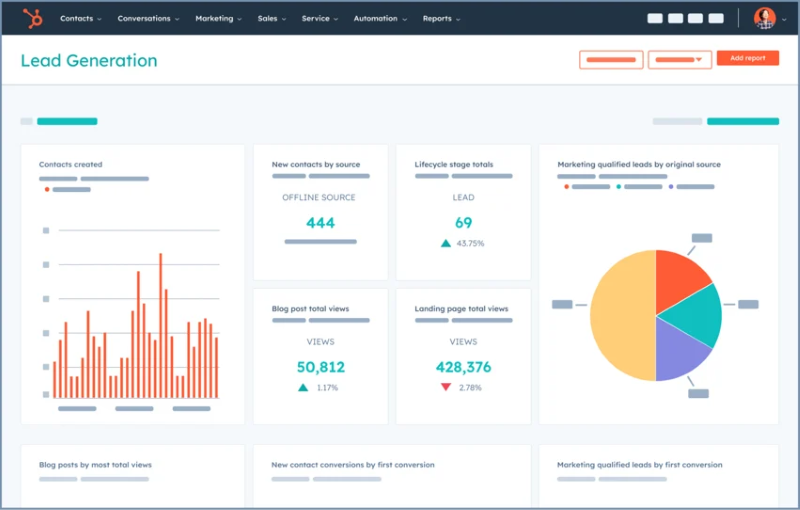
A lot more than just a content marketing platform, HubSpot is a comprehensive marketing solution. Simply sign up for the content marketing tools you need, such as their marketing hub. This hub actually integrates with their CRM hub for extra efficiency. Best of all, you can get started for free.
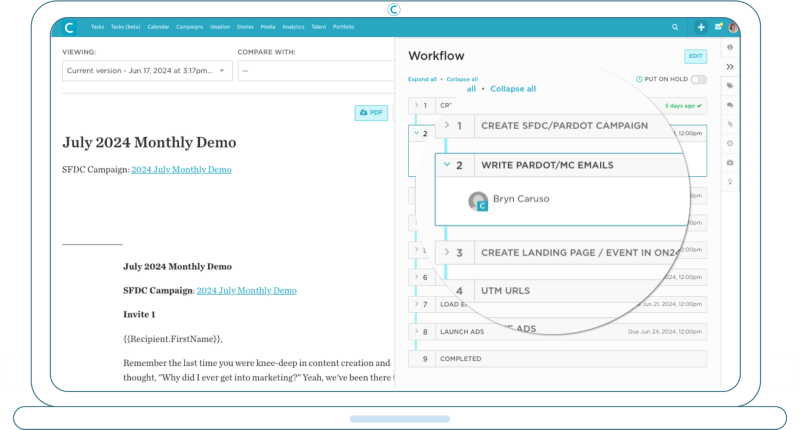
Think of Contently as a content marketing platform that acts somewhat like a marketing agency. They boast about having some of the best freelance writers available. In addition, you get comprehensive content planning and analytics capabilities. However, you keep full creative control over the content that’s put out while not having to perform many of the content management tasks.
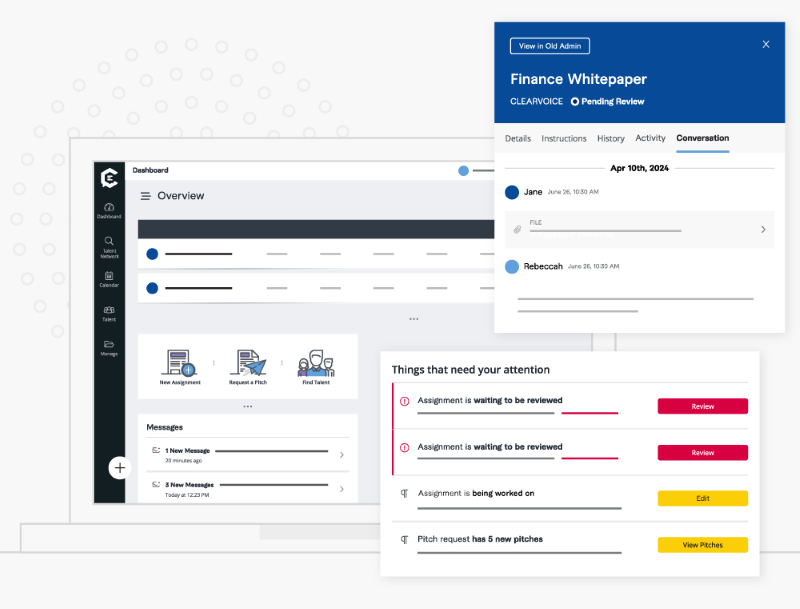
This content marketing platform is known for what they call “teamlancing.” This is where they assemble a team of freelancers who collaborate to produce content. In addition, you can use their collaboration tools to let freelancers work alongside your in-house staff, similar to the way a temp agency employee would come in and work alongside your own people. Or, you can pay ClearVoice to manage the freelancers for you. Finally, you have the analytics, social media management, and other tools found in comprehensive solutions.
4. RockContent (formerly ScribbleLive)
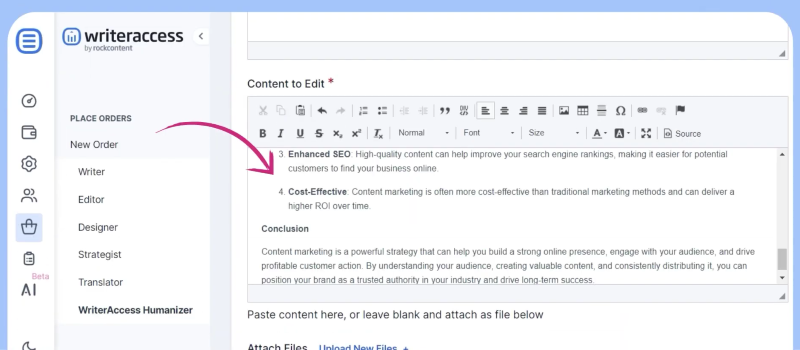
Rock Content has comprehensive tools for content marketing. However, this isn’t where the content marketing platform is strong. Rather, they excel at web hosting, consulting, and concierge services. In other words, you can hire someone from RockContent to do a lot of the work for you. Think of it as a cross between a platform for teams and a content agency.
Further Reading: 14 Content Marketing Platforms to Empower Your Digital Marketing in 2025
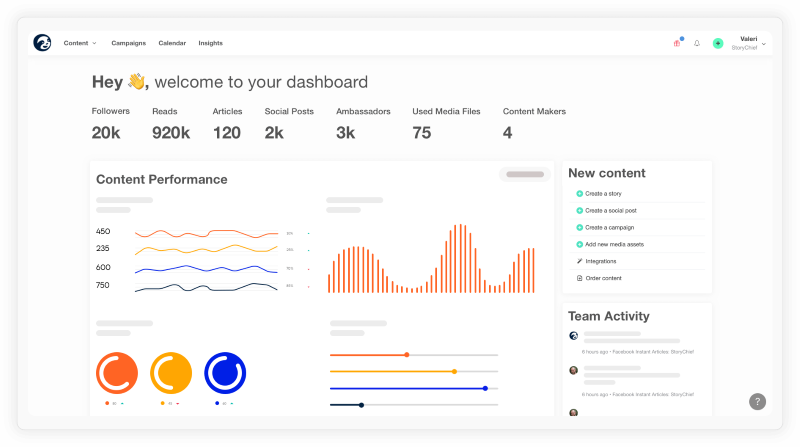
As a comprehensive content marketing platform, StoryChief has a little bit of everything, including blog writing software. However, the real standout feature is the over one thousand software integrations. These include everything you need for multi-channel content distribution. That capability is so powerful that you can schedule a whole bunch of content in five minutes.
Neal’s Take:
If you’re the type of marketer who wants to reduce tool fatigue and manage everything from strategy to analytics in one dashboard, these are your go-to platforms. I’ve seen firsthand how these full-suite solutions can bring sanity to chaotic workflows, especially for teams juggling multiple roles. That said, the trade-off is often cost and complexity—so make sure the features match your actual content marketing maturity.
Content Creation & Collaboration Platforms
This category is all about helping you actually get content out the door. Whether you’re coordinating an in-house team, tapping into a freelance marketplace, or managing workflows across departments, these platforms bring structure and accountability to the process. If you’ve ever found yourself stuck between Google Docs, spreadsheets, and endless Slack threads — this is your fix.
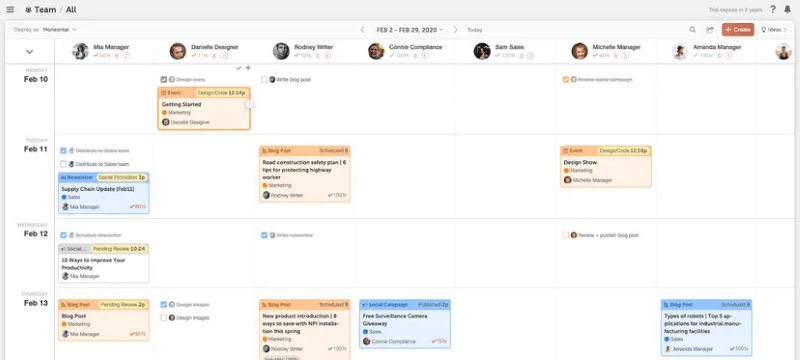
I think the word “schedule” in this content marketing platform’s name says it all. In short, CoSchedule lets you coordinate all of your marketing projects and campaigns in one place. It helps you post content, manage social media, purchase advertising, monitor results, and more. About the only thing it doesn’t do is help with content creation. Nonetheless, this is a truly powerful tool for larger teams, and it also works well if you do a lot of influencer marketing.
7.Kapost (by Upland Software)
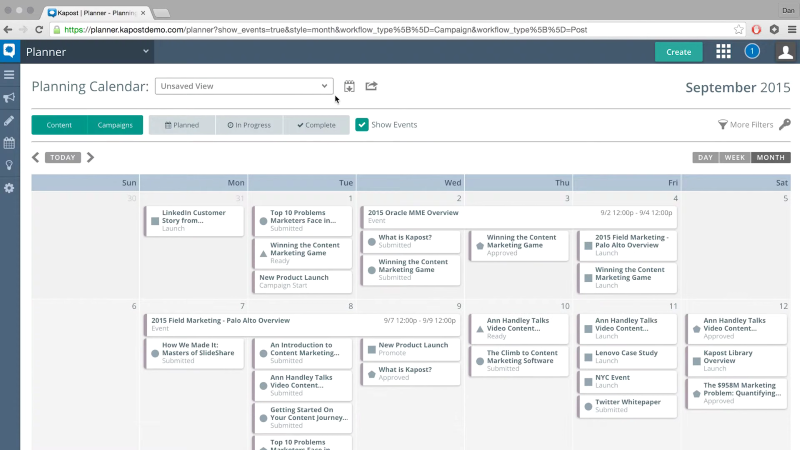
Kapost is geared towards the B2B brand. It combines CRM capabilities with comprehensive content creation and distribution. But its special sauce is the content recommendation capability: it recommends more content to a viewer based on prior habits and information in the CRM. This way, customers are more likely to see what you need them to see.
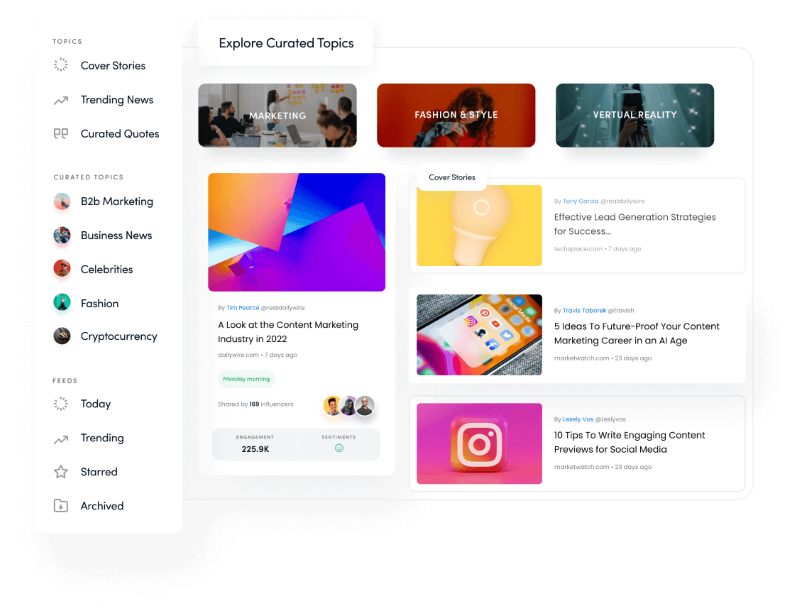
With this content marketing platform, the options are broader. ContentStudio is great for curation, but it also can handle content creation. While less powerful than many comprehensive marketing suites, you can still do most of your content marketing tasks from this particular app. You can customize your publishing and discovery tasks, delivering the right content at the right time. It even has broad collaboration and client approval facilities. For this reason, it’s a great choice for agencies and companies that have large marketing departments.
Further Reading: Best 20 Content Creation Tools Every Creator Should Know
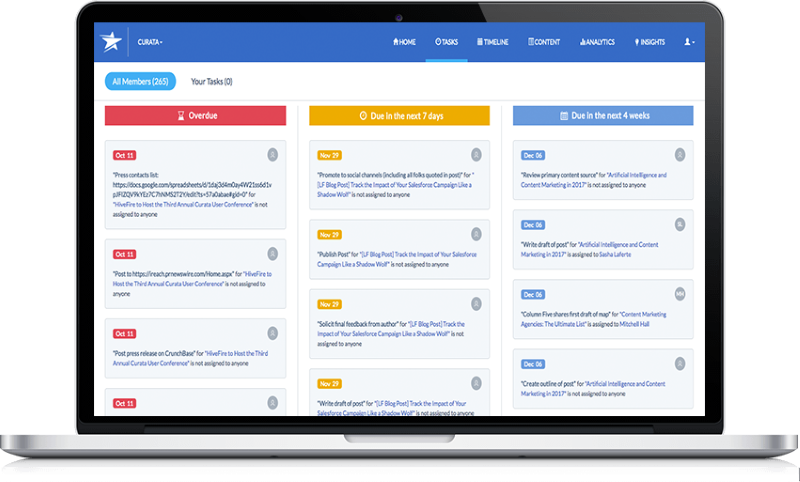
Curata is a relatively simple content marketing platform. It curates content from a wide range of sources, then filters results so only useful examples are forwarded for your attention. In addition, you can create templates for each social media platform. Finally, Curata helps with content distribution. For this, you can add your own content and distribute everything from Curata. Or, you can export your chosen curated content to different software where it is distributed.
Neal’s Take:
This is the “get stuff done” category—and one I’m particularly passionate about. Planning and operations tools often make the biggest difference in whether your strategy ever sees the light of day. I’ve worked with enough overwhelmed marketers to know that strong calendars, repeatable workflows, and easy collaboration aren’t just nice-to-haves—they’re mission critical.
Content Research & SEO Tools
Creating content without research is like writing a novel with no plot. These tools help you understand what your target audience cares about, what your competitor domains are doing, and how to optimize your content to rank higher in search. Whether it’s finding the right content for keywords or uncovering new topics through social listening and influencer insights, these platforms take the guesswork out of your strategy.
Further Reading: 7 Best Content Optimization Strategies for 2025
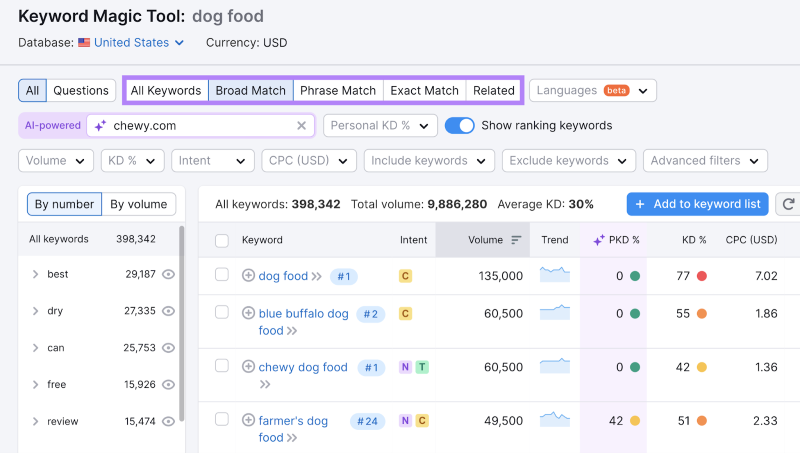
SEMrush is a content marketing platform in that it has all the tools you need for success. However, it is so much more. The application was initially developed as a search engine marketing tool, including SEO and paid search functionality. In addition, they have excellent social media management capabilities. Considering that there’s a lot of overlap between content and social media marketing, this is a huge bonus. Even more so if you have content influencers or a significant social presence.
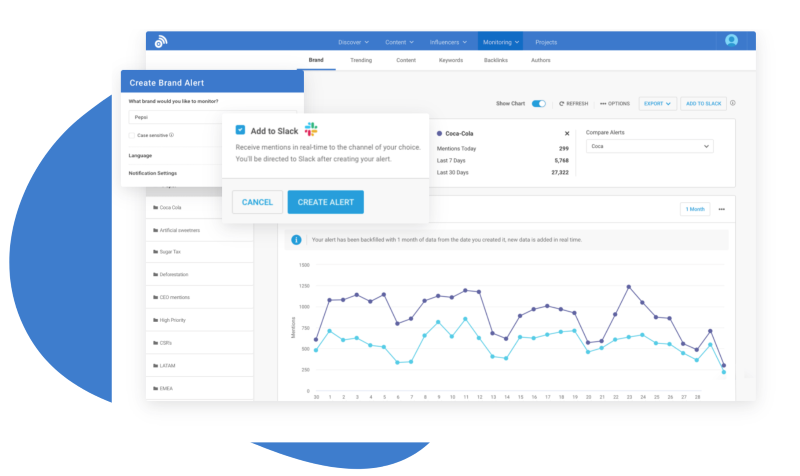
If you want to do influencer marketing, check out this content marketing platform. BuzzSumo has four basic functionalities. First, there’s standard content curation and discovery, which dishes up material for the next great social media post. Second, they have a “content research” functionality. This looks for new content in your industry but selects items you might not want to curate. If you’re doing influencer discovery, then the research function is great.
However, BuzzSumo doesn’t stop there. They offer comprehensive analytics which let you see what works best, and where your strategy needs work. Finally, there’s a social monitoring capability that assists with engagement tracking and spotting problems before they get worse. All of this is wrapped up with easy integrations, so you can publish in-app.
Further Reading: The Ultimate Guide to Content Curation: Best Practices and 21 Top Tools for 2025
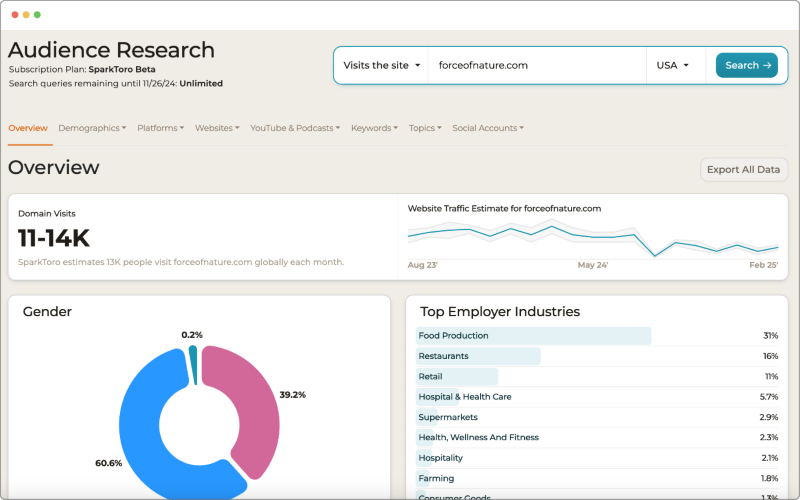
Think audience research is hard? Think again. SparkToro crawls the internet to see what your audience likes to do online. This includes social profiles, media consumption, and more. Then, the information is aggregated into consumer profiles: buyer personas on steroids. In turn, the program will tell you which podcasts or other channels to place sponsored content on in order to reach a particular customer base.
In addition, SparkToro tells you what your competitors are doing, and where their visitors hang out. This means that you can see exactly where to go in order to compete for the same eyeballs. This way, it’s easy to maximize your content marketing success.
Neal’s Take:
You can’t create great content in a vacuum. These research and SEO tools help you reverse-engineer what’s already winning so you can craft content that connects and ranks. Whether you’re building a content pillar or just need audience insight to fine-tune messaging, this stack is where strategy meets search visibility. I use these regularly for both client work and my own blog.
Content Experience & Personalization Platforms
It’s not just about getting your content out there — it’s about delivering it in the right context, to the right person, at the right time. These platforms focus on the experience side of content marketing, helping you personalize journeys, optimize engagement, and serve content dynamically based on your users’ behavior and interests. Great for marketers who want more than pageviews — they want meaningful engagement.
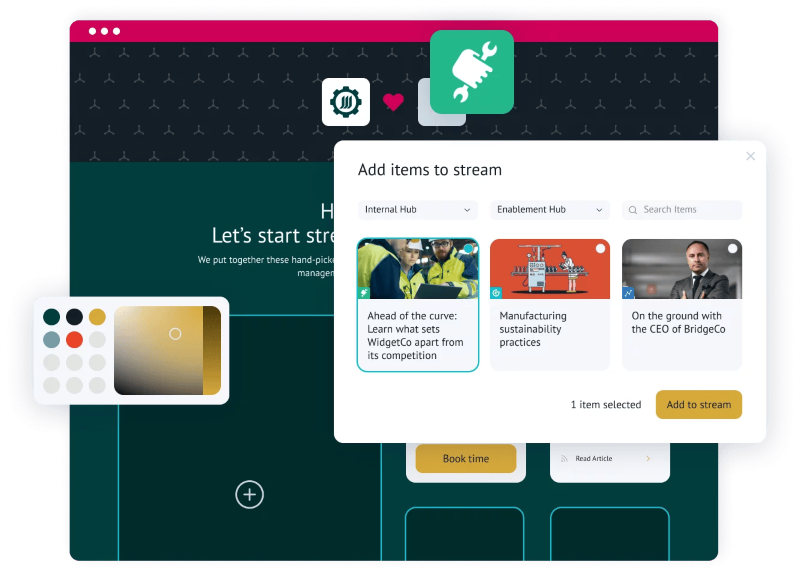
Uberflip is like your content’s personal concierge — organizing, curating, and delivering just the right piece at the right time to the right person. It helps you build binge-worthy content experiences that guide your audience down the funnel, not just attract clicks. If you’re in the B2B world and serious about driving pipeline through content personalization, Uberflip is worth a close look. You can segment by persona, industry, or buyer stage, and even plug it into your existing MAP or CRM to make it all feel seamless.
Further Reading: Content Personalization in Digital Marketing: Why It Matters and How to Do It Right
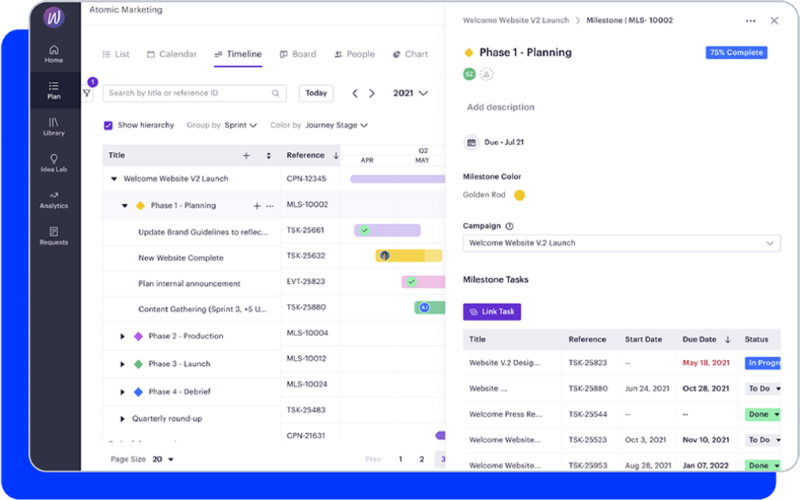
If you’re looking for a serious upgrade in how you manage content from idea to execution, Optimizely (formerly known as Welcome) might just be your new best friend. It’s built for enterprise marketing teams juggling a million moving parts — from campaign briefs and content calendars to collaboration and optimization — all in one sleek, modern interface. What makes Optimizely stand out is how deeply it integrates AI into your workflows, helping you not only manage content but actually improve its performance over time. Think of it as a powerful marketing OS that brings strategy, content ops, and execution under one roof.
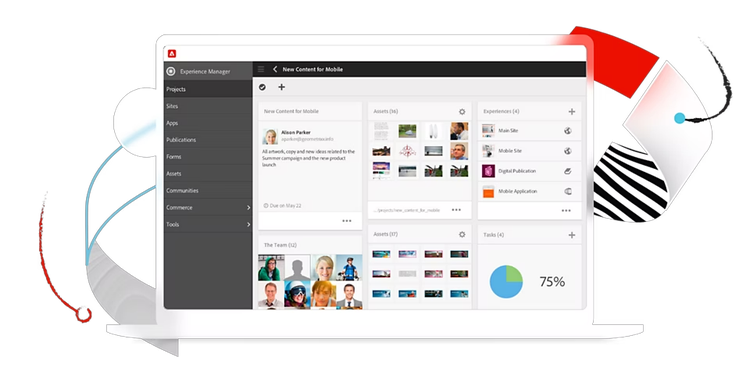
AEM is kind of like the Rolls Royce of content platforms — robust, elegant, and packed with enterprise-grade horsepower. Adobe Experience Manager is best suited for larger organizations that need tight control over content across multiple digital touchpoints (web, mobile, apps, etc.). It’s not just about managing content — it’s about delivering personalized experiences at scale. AEM pairs beautifully with Adobe’s creative suite, making it a great fit if you’re already living in the Adobe ecosystem. It’s not the easiest platform to set up, but once it’s humming, it’s an incredibly powerful engine for content-led customer journeys.
16. Seismic (formerly Percolate)
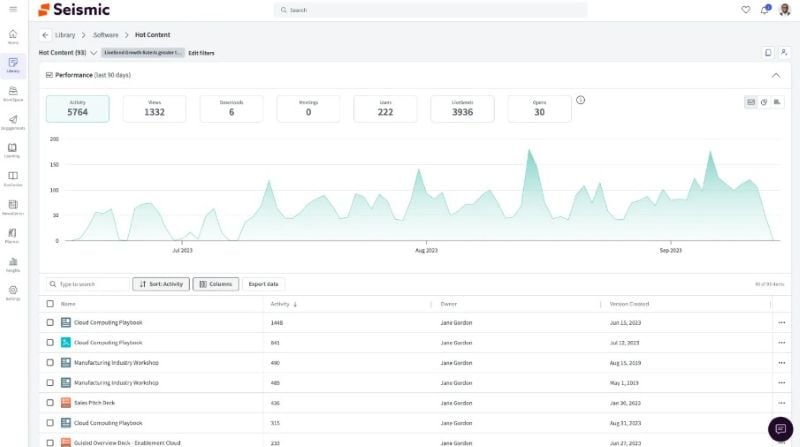
Seismic is a content marketing platform that gives your sales team the information they need to pitch a customer, while they’re pitching the customer. In essence, the idea is to bridge the gap between sales and marketing that many companies suffer from. For instance, sales might not always know what marketing has already put out. With Seismic, you don’t have that problem. Plus, the integrations help your team distribute content as appropriate.
Neal’s Take:
Once you’ve created great content, you have to serve it up in a way that’s timely and tailored. These platforms help you do that with experiences that feel personal without being creepy. I love how tools like these help brands shift from static publishing to dynamic storytelling—especially when the goal is deeper engagement or account-based marketing.
Digital Asset Management
Managing your brand at scale is tough if your assets are scattered across folders, drives, and Slack threads. Digital Asset Management (DAM) platforms offer a central home for your visuals, videos, templates, and brand materials. If you’re serious about brand consistency, version control, and team access across geographies, a good DAM is a game-changer.
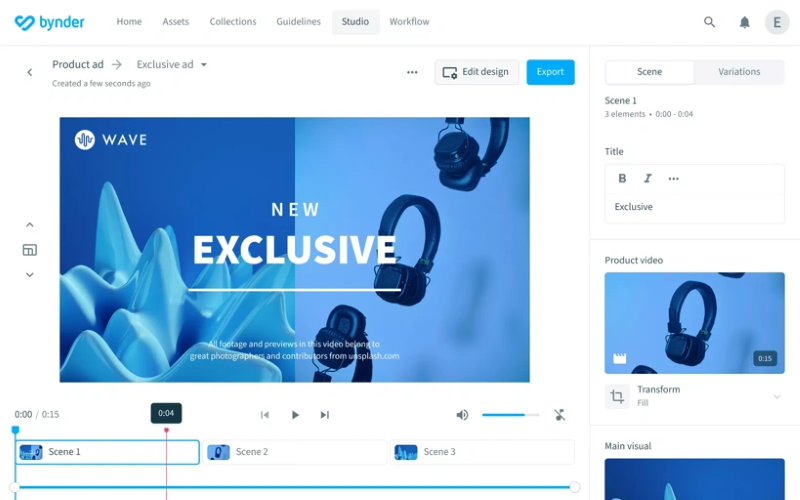
If you’ve ever had your designer send you the “final_final2_REALLYfinal.jpg,” you’ll appreciate what Bynder brings to the table. It’s a sleek, cloud-based DAM platform that keeps all your brand assets — logos, templates, videos, and visuals — in one beautifully organized place. But it’s not just about storage. Bynder helps teams maintain consistency, manage usage rights, and automate creative workflows, which is especially clutch if you’re scaling globally or collaborating across departments.
Neal’s Take:
I see so many teams lose time and brand consistency simply because their assets are scattered. If you’re serious about scaling content marketing, centralizing your creative files, branding elements, and approvals isn’t optional—it’s foundational. This category is where structure meets speed, and it saves more headaches than you can imagine.
Where Will These Content Marketing Platforms Take Your Business?
At the end of the day, the best content marketing platform for your business depends on your goals, your team’s workflow, and how ambitious your content strategy really is.
If you’re just trying to stay consistent with publishing, a simple planning and scheduling tool might be all you need. But if you’re scaling up — managing multiple content formats, team members, channels, and KPIs — then a more robust, all-in-one platform can become your content HQ.
The key is not to chase advanced features for the sake of it. Start with what will actually move the needle for your business: better strategy alignment, easier collaboration, improved SEO, or clearer performance insights. From there, you can always expand.
Hopefully, this guide gave you a clearer sense of what’s out there — and what’s possible. Whether you’re building your first editorial calendar or optimizing your tenth content pillar, the right tools don’t just make your job easier — they make your content work harder.
So now it’s your move: find the platform that fits, dive in, and start building a content operation that supports your growth, not just your marketing to-do list.
Actionable advice for your digital / content / influencer / social media marketing.
Join 13,000+ smart professionals who subscribe to my regular updates.